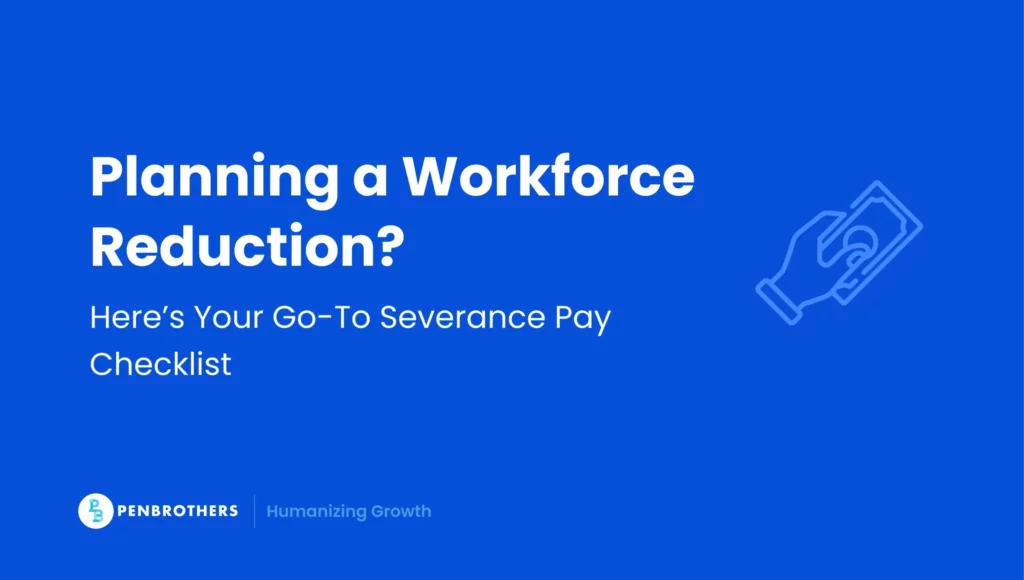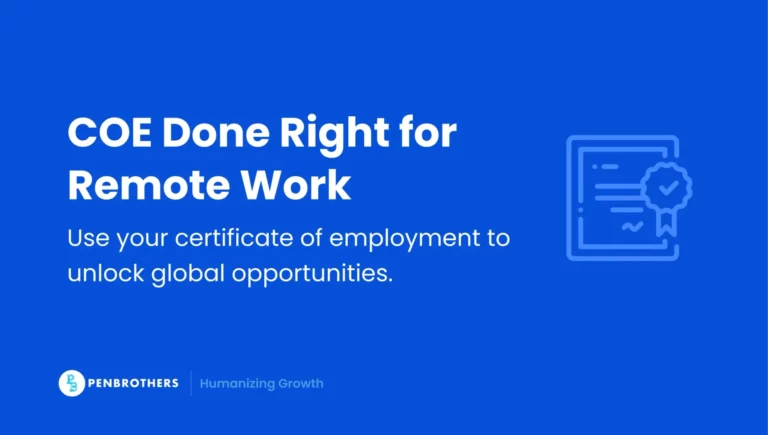Severance pay is a topic that often creates confusion among both employers and employees in the Philippines. Unlike separation pay, which is a legal requirement under certain circumstances, severance pay is generally discretionary and not mandated by Philippine labor laws. However, understanding severance pay remains important for business owners aiming to maintain good employer-employee relationships and for employees seeking clarity during employment termination or separation.
This 2026 guide will walk you through the essentials of severance pay in the Philippines, its legal context, common practices, and what both employers and employees need to know to handle severance pay correctly and ethically.
Key Takeaways
- Severance Pay is Generally Not Mandatory in the Philippines: The most critical point is that, unlike separation pay, severance pay is not legally required under Philippine labor law. It is a discretionary or contractual benefit that an employer chooses to offer.
- There is a Clear Legal Difference Between Severance Pay and Separation Pay: It is essential to distinguish between the two terms. Severance pay is typically voluntary, while separation pay is a legally mandated payment required for employees who are terminated for specific “authorized causes,” such as retrenchment or business closure.
- It Becomes a Legal Obligation if Included in a Contract: While not required by the Labor Code, if an employer includes a severance pay clause in an employment contract, official company policy, or a Collective Bargaining Agreement (CBA), it becomes a legally binding and enforceable obligation.
- A Strategic Tool for Employers: Companies that are not legally obligated to offer severance pay may still choose to do so as a strategic tool. It serves as a gesture of goodwill, helps reduce the risk of legal disputes from terminated employees, and can help maintain the morale of the remaining workforce.
What Is Severance Pay? Understanding the Basics
Financial payments known as severance pay are provided to employees when they leave a company, generally following terms set by the employer, employee, or established company rules.
There is a clear difference between severance pay and separation pay in the Philippine context. Separation pay is mandated by law in certain termination scenarios, such as retrenchment or closure of business, while severance pay is more of a goodwill gesture or contractual obligation. Many employees and employers confuse these two, but it is important to know that severance pay is not automatically required by Philippine labor law.
Is Severance Pay Mandatory in the Philippines?
Under the Philippine Labor Code, severance pay is generally not required by law except when it is included in employment contracts, company policies, or collective bargaining agreements. In comparison, separation pay must be given under the law in specific scenarios, like:
- Retrenchment to prevent losses
- Closure of business
- Installation of labor-saving devices
- Other authorized causes
If no such agreements or policies exist, employers are under no legal obligation to provide severance pay. This gives companies flexibility but also highlights the importance of clear communication and documentation regarding severance benefits.
When and Why Do Employers Offer Severance Pay?
Employers may voluntarily provide severance pay in situations such as:
- Mutual separation agreements
- Layoffs due to restructuring or downsizing
- Termination by the employer without cause
Offering severance pay can benefit employers by:
- Demonstrating compassion and goodwill
- Reducing the risk of legal disputes or claims
- Preserving company reputation and morale among remaining employees
Severance packages may vary depending on the employee’s position and tenure. Senior or executive employees may receive more generous packages compared to rank-and-file workers.
Components of a Typical Severance Package in the Philippines
While there is no standard severance package mandated by law, common components often include:
- Lump sum cash payment: Often calculated based on length of service or monthly salary
- Payout for unused leave credits: Employers may include payment for unused vacation or sick leave
- Bonuses or incentives: Sometimes included as part of the package
- Other benefits: Such as career counseling or job placement assistance (less common)
It is important to note that severance pay packages do not typically include continuation of health insurance or other post-employment benefits, unless specifically agreed upon.
Legal Considerations and Compliance for Employers
Employers must carefully review employment contracts and company policies regarding severance pay to ensure compliance. Key legal points include:
- If severance pay is promised in a contract or collective bargaining agreement, failure to pay can result in legal penalties.
- Severance pay should not be confused with separation pay, which is legally required in specific cases.
- Proper documentation and a clear severance agreement help avoid misunderstandings and disputes.
- Employers should ensure all final pay, including severance, is processed in a timely manner and in compliance with labor standards.
Taxation: Is Your Severance Pay Tax-Exempt?
In 2026, the taxability of your payout depends entirely on the cause of separation:
- Tax-Exempt: Statutory Separation Pay is exempt from withholding tax if the cause is “beyond the control of the employee” (e.g., redundancy, retrenchment, or illness) as per Section 32(B)(6)(b) of the Tax Code.
- Taxable: Discretionary Severance Pay (offered during voluntary resignation or via a Mutual Separation Agreement) is generally treated as taxable income because the separation is considered “voluntary” or “within the employee’s control.”
Note: To process tax-exempt payouts, the BIR usually requires a Certificate of Tax Exemption and a copy of the Notice of Termination filed with DOLE.
Advice for Employees: What to Know About Severance Pay
Employees should be aware of the following:
- Severance pay is not automatically guaranteed unless stated in the employment contract or company policy.
- Employees can negotiate severance terms, especially if the employer offers voluntary severance.
- If severance pay is promised but not paid, employees can file a complaint with the Department of Labor and Employment (DOLE).
- Severance pay is separate from other end-of-employment benefits, such as separation pay or retirement benefits.
Understanding your rights and reviewing any agreements before signing separation documents is critical.
Severance Pay vs Separation Pay: Quick Comparison Table
| Aspect | Severance Pay | Separation Pay |
| Legal Basis | Generally discretionary, contractual basis | Required by Philippine labor law in specific cases |
| When Applicable | Voluntary, mutual agreements, and company policy | Retrenchment, closure, labor-saving devices, authorized causes |
| Calculation Basis | Varies; often based on company policy or agreement | Minimum of 1 month’s salary per year of service or fraction thereof |
| Obligation to Pay | No legal obligation unless agreed upon | Legal obligation under the Labor Code |
| Other Benefits Included | Depends on agreement | Includes unused leave and other statutory benefits |
The 30-Day Rule: Mandatory Timeline for Release
Under DOLE Labor Advisory No. 06, Series of 2020, all employers are mandated to release an employee’s “Final Pay”—which includes any severance or separation pay—within thirty (30) calendar days from the date of separation.
- The Clearance Exception: Employers may withhold payment only until the employee completes the clearance process (returning company property like laptops or IDs).
- Penalty for Delay: Failure to release funds within this window allows the employee to file a Request for Assistance through the Single Entry Approach (SEnA) at the nearest DOLE office.
Conclusion
While severance pay is not legally mandated in the Philippines in most cases, it remains a valuable tool for employers to show goodwill and reduce legal risk. Both employers and employees should understand the distinction between severance pay and separation pay and ensure all agreements are documented.
Employers are encouraged to develop fair severance policies aligned with company values and legal compliance. Employees should review their contracts carefully and seek advice if uncertain about their severance entitlements.
For tailored guidance, consulting with legal and HR professionals is always recommended to ensure smooth and compliant separation processes.
Frequently Asked Questions
No, they are different. Separation pay is legally mandated by the Philippine Labor Code in specific cases of termination, such as retrenchment or business closure. Severance pay is generally a discretionary benefit offered by an employer based on a company policy or an employment contract and is not typically required by law.
Severance pay in the Philippines is not legally mandated and is calculated based on the terms stated in the employment contract, company policy, or mutual separation agreement. If separation pay applies instead, it is computed according to the Labor Code, typically based on the employee’s length of service and last salary.
Yes. If severance pay is not explicitly mentioned in your employment contract, the company handbook, or a collective bargaining agreement, an employer is under no legal obligation to provide it.
An employer is legally required to provide separation pay when an employee is terminated for what are known as “authorized causes” under the Labor Code. The most common of these causes include retrenchment (downsizing to prevent losses), the closure or cessation of the business, and the installation of labor-saving devices.
If severance pay is included in your employment contract, it becomes a legally enforceable obligation. If your employer fails to pay it upon your departure, you can file a formal complaint with the Department of Labor and Employment (DOLE) or pursue other legal action to claim it.






